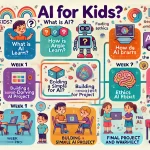
Experts Urge Safe and Innovative Use of Generative AI Tools in Schools
February 5, 2024As the 2024 World Digital Education Conference concluded in Shanghai, experts and officials emphasized that rather than imposing bans, generative artificial intelligence (AI) tools, such as ChatGPT, should be embraced in schools while being utilized safely and appropriately. The rapid progress of AI technologies has opened new avenues for educators and students, presenting opportunities and challenges in equal measure.
Zheng Qinghua, president of Tongji University, stressed the importance of guiding young people to comprehend knowledge created by technology while motivating their passion for learning. Generative AI technologies have become integral to obtaining and disseminating knowledge, influencing teaching, learning, and school management, according to Zheng, who is also an academician at the Chinese Academy of Engineering.
Various AI models, including the globally recognized ChatGPT, have found applications in educational activities, offering assistance to students with assignments and tests. For instance, Baidu Inc.’s Ernie Bot, an AI chatbot, has gained popularity among college students in China.
However, concerns have arisen about academic propriety and the potential disruptive effects of generative AI in education. A survey by Study.com revealed that 89 percent of students had used ChatGPT to aid with homework assignments. Zheng emphasized the need to move beyond AI providing straightforward answers and instead focus on cultivating innovation and integrating disciplines to solve real-world problems.
Colin Bailey, president of Queen Mary University of London, urged a shift in focus from whether to use generative AI in education to how to use it safely, effectively, and appropriately. Banning such technologies in schools is not the solution; instead, the challenge lies in ensuring their proper use to enhance education and equip students with skills relevant to the evolving job market.
Bailey highlighted the potential benefits of generative AI in preparing students for real-world applications, as many industries increasingly embrace this technology for increased efficiency. Teachers, too, have benefited from AI in improving student evaluations through personalized data analysis.
However, Bailey cautioned against poor design and misuse of AI systems, which could lead to individual and social harm due to biased data and privacy concerns. Globally, regulatory approaches are emerging to support the ethical and responsible use of generative AI, including the United States’ Blueprint for an AI Bill of Rights and the pro-innovation approach to AI regulation in the United Kingdom.
In China, interim measures have been implemented by the Cyberspace Administration and other departments to manage generative AI services. Chen Jie, vice-minister of education, emphasized the need for cooperation among education and research institutions to address potential problems related to AI, such as privacy leaks, bias, and algorithm abuse. China has established expert advisory bodies for education digitalization and an ethics committee for AI, contributing to a standardized system for the application of digital education, Chen added.


















